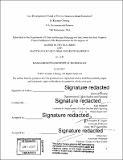| dc.contributor.advisor | Karl Seidman. | en_US |
| dc.contributor.author | Cheung, Karmen | en_US |
| dc.contributor.other | Massachusetts Institute of Technology. Center for Real Estate. Program in Real Estate Development. | en_US |
| dc.date.accessioned | 2017-09-15T15:31:26Z | |
| dc.date.available | 2017-09-15T15:31:26Z | |
| dc.date.copyright | 2017 | en_US |
| dc.date.issued | 2017 | en_US |
| dc.identifier.uri | http://hdl.handle.net/1721.1/111376 | |
| dc.description | Thesis: M.C.P., Massachusetts Institute of Technology, Department of Urban Studies and Planning, 2017. | en_US |
| dc.description | Thesis: S.M. in Real Estate Development, Massachusetts Institute of Technology, Program in Real Estate Development in conjunction with the Center for Real Estate, 2017. | en_US |
| dc.description | Cataloged from PDF version of thesis. | en_US |
| dc.description | Includes bibliographical references (pages 84-87). | en_US |
| dc.description.abstract | Chinatowns in cities like Boston, New York, or Philadelphia have well established reputations as vibrant ethnic neighborhoods that draw tourists as well as working-Chinese immigrants. The individual businesses that line the streets of Chinatown are crucial to creating these unique urban neighborhoods. As cities are undergoing a new era of growth and real estate activity in urban centers is booming, the impacts on small businesses has not yet been widely researched. This thesis uses Chinatowns (in Boston, New York, and Philadelphia) as case studies to uncover the impacts of new real estate developments on small businesses. The research relied on a mixed-method approach, utilizing quantitative data from city reports or census data, as well as qualitative data derived from interviews with local stakeholders, particularly small business owners. The broad categories of impact documented include: (1) changes to inventory and availability of ground floor retail space, (2) a homogenization of storefront design, (3) changes to the residential community, and (4) rise in occupancy costs. In contrast, the top concerns identified by business owners were (1) the image of Chinatown as dirty and (2) the availability of parking. This thesis was not able to fully address the mismatch between the impacts of development and the concerns of business owners but is an area that deserves more research. The conclusion of this thesis provides readers with a preliminary framework for assessing displacement risks that can be applied to other ethnic districts and suggests possible interventions that can mitigate some of these risks. | en_US |
| dc.description.statementofresponsibility | by Karmen Cheung. | en_US |
| dc.format.extent | 87 pages | en_US |
| dc.language.iso | eng | en_US |
| dc.publisher | Massachusetts Institute of Technology | en_US |
| dc.rights | MIT theses are protected by copyright. They may be viewed, downloaded, or printed from this source but further reproduction or distribution in any format is prohibited without written permission. | en_US |
| dc.rights.uri | http://dspace.mit.edu/handle/1721.1/7582 | en_US |
| dc.subject | Urban Studies and Planning. | en_US |
| dc.subject | Center for Real Estate. Program in Real Estate Development. | en_US |
| dc.title | New development : friend or foe to Chinatown small businesses? | en_US |
| dc.title.alternative | Friend or foe to Chinatown small businesses? | en_US |
| dc.type | Thesis | en_US |
| dc.description.degree | M.C.P. | en_US |
| dc.description.degree | S.M. in Real Estate Development | en_US |
| dc.contributor.department | Massachusetts Institute of Technology. Center for Real Estate. Program in Real Estate Development. | en_US |
| dc.contributor.department | Massachusetts Institute of Technology. Center for Real Estate | |
| dc.contributor.department | Massachusetts Institute of Technology. Department of Urban Studies and Planning | |
| dc.identifier.oclc | 1003291492 | en_US |
